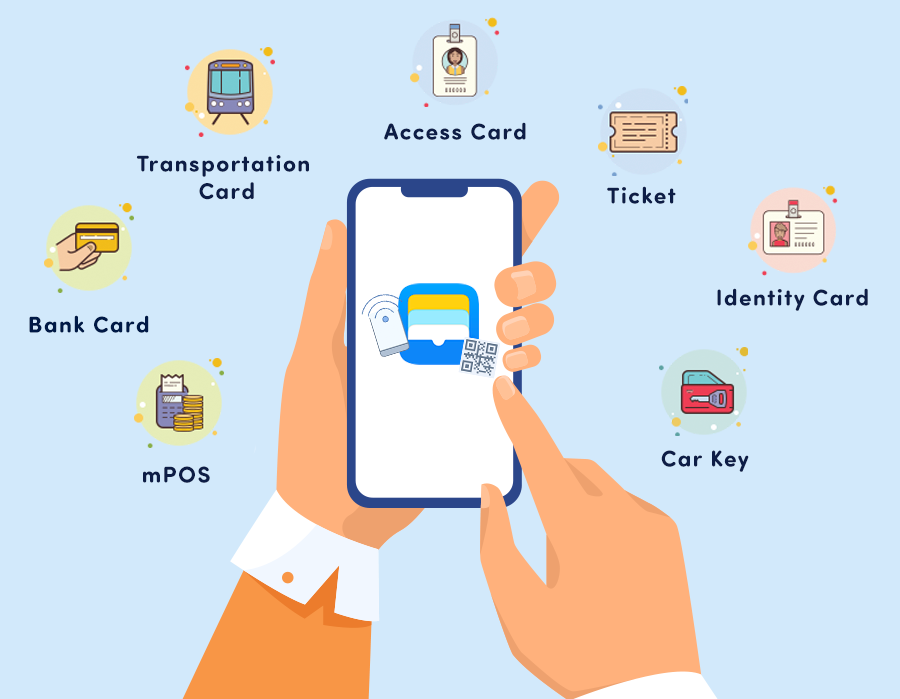Digital ID wallet-DigiLocker Comparison
An innovative technological advancement created to simplify and safeguard the digital age’s maintenance of personal identification is the digital ID wallet. Several identity documents, including passports, driver’s licenses, medical data, and financial credentials, are combined into a single, conveniently accessible digital format by means of this digital solution.
Digital ID wallets give customers a safe and effective means to store, manage, and share their identification information by utilising blockchain technology, biometric authentication, and cutting-edge encryption techniques.

Furthermore, digital ID wallets provide unmatched ease. Users may easily communicate with government agencies, financial institutions, healthcare providers, and other businesses by using smartphones or other digital devices to access their identity documents while on the go. This improves accessibility and efficiency across a range of industries while also improving the user experience.
To address the changing demands of the digital world, the Digital ID wallet essentially represents the future of personal identification by fusing ease, security, and advanced technology. The potential for this technology to change how people manage and safeguard their identities in a world that is becoming more interconnected is enormous.
A related article
The European Union’s Digital ID Wallet
With the intention of launching digital identification wallets for EU citizens, residents, and businesses by 2026, the European Union is making quick progress towards its intentions to create a unified digital identity system. Said to revolutionise access to public and private services across the international bloc, these digital ID wallets, which were announced in 2021, are presently undergoing pilot tests across a variety of use cases.
How will the EU’s digital ID wallets work?
Personal identity documents, including passports, driver’s licences, medical information, and banking credentials, can all be securely stored in one place using digital ID wallets. These wallets, which are accessible through cellphones and other digital devices, will allow users to easily authenticate themselves in any EU member state. The solution will guarantee the security and immutability of personal data by combining blockchain technology, biometric authentication, and superior encryption.
Digital ID wallets will replace paper IDs as the primary means of facilitating communications with businesses, financial institutions, healthcare providers, and the government. With this technological change, the EU hopes to improve cross-border accessibility, lower administrative burdens, and improve the user experience.
How Will Digital ID Wallets Be Kept Safe and Private?
Digital ID wallet security and privacy must be prioritised. Modern security techniques will be employed by the EU system, such as:
Secure encryption methods safeguard private information by rendering it unintelligible to unauthorised individuals.
Biometric authentication will provide an extra degree of protection using facial recognition, fingerprints, and other biometric techniques.
Blockchain Technology:
By establishing an unchangeable and visible record of every transaction, this decentralised ledger technology will further protect against fraud and unauthorised access.
User Control: To ensure privacy, people will have total control over who can access their data and how, allowing them to decide what use to make of it.
Digital ID Wallets: Pros and Cons
The Positive
Convenience: Streamlined service access for all EU members.
Strengthened safeguards against fraudulent activities and identity theft.
Efficiency: Less documentation and quicker verification procedures.
The Poor
The implementation challenges include coordinating efforts across different nations with disparate degrees of digital infrastructure.
Technological Barriers: Ensuring that all residents, regardless of level of tech expertise, can utilise it and find it easy to use.
The Repulsive
Privacy concerns: Even with strong security measures in place, worries about data abuse and spying still exist.
Resistance to Change: For some people, especially the elderly or those with limited access to digital devices, adjusting to new technologies can be difficult.
To sum up, the digital ID wallets introduced by the EU have the potential to revolutionise identity verification procedures and pave the way for a safe and user-friendly future. It will be essential to resolve the issues and obstacles as the pilot tests go on in order to guarantee a seamless and effective rollout by 2026.
Digital ID Wallet vs. DigiLocker: A Comparison
Scope and reach
Digital ID Wallet: Anticipated to be launched by 2026, the Digital ID Wallet of the European Union will serve as a common identity system for all EU citizens, residents, and businesses. Its goal is to enable smooth access to both public and private services in any EU member state.
DigiLocker is an Indian government programme that is primarily intended for Indian nationals. It offers a safe cloud-based platform for document and certificate storage, sharing, and verification that was introduced in 2015.
Security and Technology
Digital ID Wallet: To protect data security and privacy, this solution makes use of blockchain technology, biometric authentication, and sophisticated encryption. Users decide who may access their data and for what purposes, giving them complete control over it.
DigiLocker: To secure documents, DigiLocker use Aadhaar-based authentication and SSL encryption. It gives customers access to a cloud storage account that is connected to their Aadhaar number, making it simple to view and share digital documents.
Applications
Digital ID wallets are anticipated to be utilised by a number of industries, such as financial institutions, healthcare, government agencies, and enterprises operating in the EU. Its objective is to make cross-border transactions easier and more accessible.
DigiLocker: Used mostly in India for the storage and retrieval of official papers, including identification documents, diplomas, and driver’s licences. It attempts to expedite verification procedures and lessen the need for physical papers.
Privacy Issues
Digital ID Wallet: The EU’s decentralised digital ID system continues to raise worries about data misuse and spying, even with strong security protections in place.
DigiLocker: Although usually regarded as secure, privacy concerns are centred around data centralization and the possibility of misusing information connected to Aadhaar.
To sum up, Digital ID Wallet and DigiLocker share the goal of improving digital identification and document management; nevertheless, they diverge greatly in terms of scope, technology, and geographic emphasis.
What is the purpose of a digital locker?
By giving citizens access to genuine digital documents in their digital document wallet, DigiLocker seeks to “empower” citizens through digital means. DigiLocker is a safe online platform for exchanging, storing, and authenticating documents and certifications.
What is the most secure type of digital wallet?
Google Pay is a quick and safe digital wallet that works well for both private and professional transactions.
What is the difference between a digital identity and a digital wallet?
An individual can be individually identified by their use of behavioural patterns and distinctive identities. Conversely, a digital wallet is a virtual wallet or storage device that allows a user to store and manage digital assets.3.




